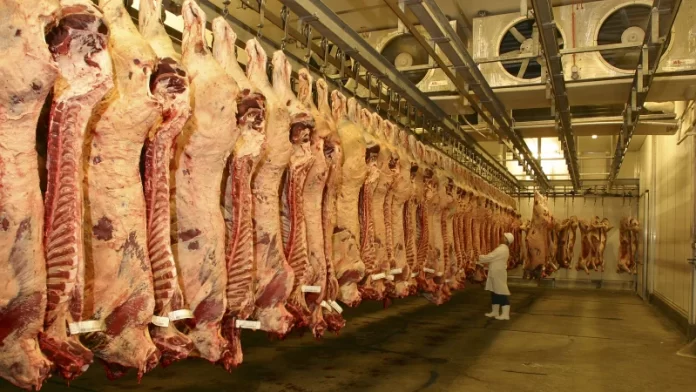Pacific island workers employed at a Victorian abattoir are taking home little more than $9(US$6.62) an hour after hundreds of dollars are deducted from their weekly pay to cover airfares, visas, phone plans, housing and furniture rentals.
Contracts between Pacific islander meat workers and labour hire firm Regional Workforce Management Pty Ltd show some workers are left with just $310 (US$228) from their weekly pay of $753(US$554) after the deductions are made, prompting exploitation concerns.
Although some deductions stop once airfares, vaccinations and visas have been repaid over a period of four months, contracts show other charges, including $100 (US$73) a week for housing and $50 (US$36) a week for transport, continue throughout a worker’s three-year visa.
Details of the Pacific islander contracts come amid an Australian government investigation into worker exploitation in the nation’s meat industry, which has for years been heavily reliant on migrant labour supplied by recruitment and labour hire agencies.
The Australian Meat Industry Employees Union says Pacific islander workers at a Gippsland abattoir reported they had been told by management that it was “illegal” for them to request itemised copies of their phone plan or furniture rentals. The company that runs the facility did not respond to requests for comment before deadline and The Age has not been able to independently verify the claims.
Union state secretary Paul Conway said workers on the Pacific islander contracts were expected to be available to work across seven days a week and at any time during a 24-hour period.
Conway said Australian meat-processing companies had become increasingly reliant on workers from the Pacific since the emergence of the COVID-19 pandemic last year.
This was because travel restrictions to protect against the spread of coronavirus meant meat-processing companies were unable to bring in migrant workers from Asia, he said.
Under Australia’s Pacific Labour Mobility Scheme, workers from Fiji, Kiribati, Nauru, Papua New Guinea, Samoa, the Solomon Islands, Timor-Leste, Tonga, Tuvalu and Vanuatu can get visas to work in Australia for three years in industries where there are domestic labour shortages.
The scheme began in 2018 and participating employers must pay workers federal award wages. It has been promoted heavily by the Australian government as a way for Pacific islanders to access the Australian economy and send money back to their home countries.
But allegations of exploitation and mis-treatment of workers have emerged from time to time. In 2018, the National Union of Workers lodged action in the Fair Work Commission over the alleged underpayment and mistreatment of workers brought out from Vanuatu to work on Victorian farms.
Former Immigration Department deputy secretary Abul Rizvi warned there were “serious levels” of exploitation in the Pacific Labour Scheme and Australia’s seasonal worker programme largely going unreported because workers feared losing their employer sponsor and visa status if they complained.
He said the federal government’s announcement last month of a new agricultural visa scheme –which will be available to low-skilled workers and have a pathway to permanent residency – would probably “turbocharge” further exploitation.
“To date, there have been at least 22 deaths on this [Pacific or seasonal worker] visa. I suspect this is the tip of an iceberg of abuse and exploitation,” he said.
Former Australian Competition and Consumer Commission chief Allan Fels said the new agricultural visa would increase the risk of wage exploitation in Australia.
Professor Fels, who co-chaired the federal government’s Migrant Worker Taskforce, said more Fair Work Ombudsman inspectors were needed to help offset the risk of greater exploitation in the agricultural sector.
He also said the Department of Home Affairs should make an example of meat-processing companies who were doing the wrong thing by migrant workers by suspending their entitlement to access foreign labour.
Professor Fels added that it would be timely for the Morrison government to introduce national legislation to cover the labour hire industry which supplied migrant workers to a range of Australian companies and to make wage theft a criminal offence.
Both were key recommendations made in the Migrant Worker Taskforce’s 2019 report.
A spokeswoman for the Department of Foreign Affairs and Trade, which runs the Pacific scheme, said worker exploitation was not tolerated, and approved employers were subjected to regular monitoring to ensure pay and deductions were lawful.
The Pacific scheme allows employers to deduct costs such as airfares and visas from workers’ wages over four months. Ongoing deductions are also permitted for housing and transport.
Comment was also sought from Regional Workforce Management.
SOURCE: SMH/PACNEWS














